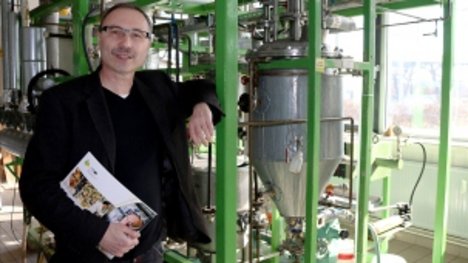Confidence is good, surveillance with ÖHMI is better

Magdeburg-based service provider uses the latest technology for analysis and consultation
“ÖHMI Lebensmittel- und Umweltlabor” is written in blue on the white car finish – “Wherever you see our company vehicles, you can buy your food products with confidence,” smiles Carsten Transfeld. “We accompany and support manufacturers and traders in guaranteeing the quality of their goods. The legal requirements for the quality of food products are high, but so is the personal responsibility,” says the chairman of the ÖHMI corporation, “Many manufacturers and traders voluntarily commission us to carry out regular surveillance.”
Food product and environmental analysis is one of the business fields of the Magdeburg-based company. Food products, agricultural products, oils and fats, together with pharmaceuticals, drinking water and soil samples, are some of the items investigated in ÖHMI’s test laboratories. “We offer laboratory analysis, consultation and certification services for the fields of quality, security, health protection and environmental protection. All from a single source,” says Transfeld.
ÖHMI always has the very latest knowledge when it comes to developing modern test procedures and manufacturing techniques. Our innovative collaboration with the “Pilot Pflanzenöltechnologie Magdeburg” association, or PPM for short, plays a major part in this. The private, non-university facility for industrial research was founded in 1993 and is managed by Frank Pudel. “Our task is the practical, application-focused research and development of process technology, to obtain vegetable oils and fats and co-products, among other things,” says Pudel. The association’s clients include the food processing industry, chemical industry and mechanical and plant engineering sectors from all over Germany and overseas.
PPM develops the procedures and products until they are ready to be launched on the market. “Everything is tested in our technical centre on a small scale,” says Frank Pudel, emphasising that one of the original tasks of the association was to construct this pilot plant. This task was completed with perfection. “We have a unique selling point throughout Europe in the form of our technical centre,” says Pudel with pride.
The industrial buildings of PPM and ÖHMI are not only linked through their partnership but are also in close proximity to one another. The ÖHMI building has its ancestral home in the industrial zone named “Alte Ölmühle” after the old oil mill of Magdeburg. In 1950, ÖHMI was founded as the central laboratory of the oil and margarine industry in the GDR and developed into the technology and service provider it is today through a gradual expansion of its competences and capacities after the German reunification.
“The entire production chain within the food industry is legally obligated to implement measures to minimise the risks to health. We support the companies in doing this,” says Carsten Transfeld.
At the moment, new procedures developed by PPM to manufacture cooking fats and oils are being introduced. “They are necessary for reasons of quality assurance,” says Pudel, explaining about the scientists at the University of Prague who discovered carcinogenic substances in refined vegetable oils in 2007; whose technical designation is: 3-MCPD and glycidyl fatty acid esters. These contaminants develop during the refinery process. Without such processing, many freshly-pressed crude oils would be inedible and unsuitable for technical uses.
As many foodstuffs are produced from or with refined oils and fats – including all pastry products, all deep-fried products – the initial question was whether there was a health risk for consumers. To evaluate this risk accurately and provide suitable recommendations for action to companies, a research project was initiated by the leading associations of the German food industry, which was launched at PPM and other involved partners in 2012.
“In the first instance, it had to be clarified,” says Frank Pudel, “under which circumstances these contaminants are formed.” All the investigations used palm oil. It is versatile and has a wide range of uses. The disadvantage: A comparably high potential for the formation of 3-MCPD and glycidyl fatty acid esters was found in palm oil. Pudel travelled to Indonesia and Malaysia to begin the analysis at the very beginning of the production chain. The result: “The precursors of the contaminants form already in the over-ripened fruit on the tree and in the fruit stored at the side of the road.” Pudel determined that it was necessary to shorten the channels and times for the fruit to arrive in the oil mill.
But for the most part, Frank Pudel states that no direct influence can be exerted on the production of oils and fats in other countries. As a result, procedures have been researched and developed which help the manufacturing companies in Germany to reduce the content of 3-MCPD and glycidyl fatty acid esters during the production process so that they do not represent a health risk.
The research project has been concluded. Accurate analysis methods to determine 3-MCPD and glycidyl fatty acid esters are now part of the “tool box” of ÖHMI laboratory assistants. “And we can provide our oil refining companies with proven recommendations for action as to how they can influence certain parameters within the production process,” says Carsten Transfeld.
Author: Kathrain Graubaum on behalf of IMG Investment and Marketing Corporation Saxony-Anhalt
BU: "We have a unique selling point throughout Europe in the form of our technical centre,” says Frank Pudel, head of the “Pilot Pflanzenöltechnologie Magdeburg” research facility.”
Contact:
Dr. Frank Pudel
Pilot Pflanzenöltechnologie Magdeburg e.V.
Berliner Chaussee 66
39114 Magdeburg
pudel@ppm-magdeburg.de
www.ppm-magdeburg.de
Dr. Carsten Transfeld
ÖHMI AG
Berliner Chaussee 66
39114 Magdeburg
oehmi.ignore@oehmi.de
www.oehmi.de
